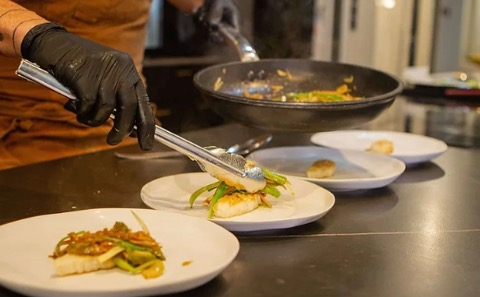
Backed by Singapore's ambitious food security goals, Steakholder Foods positions itself at the forefront of sustainable seafood innovation through its collaboration with UMAMI Bioworks
In a pivotal development that could transform the seafood industry, Steakholder Foods has announced a partnership with UMAMI Bioworks aimed at commercializing 3D-printed cultivated fish fillets. This collaboration, funded through the Singapore-Israel Industrial R&D (SIIRD) grant, marks the culmination of two years of research and development, setting the stage for innovative seafood products to reach consumers. The announcement highlights the growing intersection of technology and sustainability in food production.
Both companies are at the forefront of their respective fields. Steakholder Foods specializes in alternative proteins and 3D printing technologies, while UMAMI Bioworks is recognized for its advancements in cultivated seafood. Together, they aim to address the urgent need to mitigate the environmental impact of traditional fishing practices, which have led to declining fish populations and damage to marine ecosystems.
The partnership is particularly significant in the context of Singapore's burgeoning food innovation landscape. As a global hub for food technology, Singapore is actively promoting initiatives to enhance food security and sustainability. The city-state's "30 by 30" goal aims for the country to produce 30% of its nutritional needs locally by 2030, catalyzing investment and research in cellular agriculture. This environment is ideal for Steakholder Foods and UMAMI Bioworks to thrive and effectively commercialize their products.
The collaboration aims to produce sustainable and ethical alternatives to conventional seafood. By leveraging 3D printing technology, Steakholder Foods and UMAMI Bioworks have developed a portfolio of prototype designs that mimic the taste and texture of traditional fish products. This innovation not only caters to the growing consumer demand for high-quality seafood alternatives but also addresses ecological concerns surrounding overfishing.
Arik Kaufman, CEO of Steakholder Foods, emphasized the importance of the partnership in achieving commercialization goals, stating, "By leveraging our collective strengths, we aim to quickly develop commercial products that meet industry needs while aligning with regulatory and sustainability goals." Kaufman highlighted that their focus will be on bringing these advanced seafood products to market efficiently.
Mihir Pershad, CEO of UMAMI Bioworks, noted that the collaboration is crucial for scaling up production and ensuring that these sustainable seafood options can reach consumers globally. The partnership will also work closely with Singapore's National Additive Manufacturing Innovation Cluster (NAMIC), hosted by the Agency for Science, Technology and Research (A*STAR). This collaboration will facilitate the transition from research to market-ready products, ensuring compliance with food safety standards.
The implications of this partnership extend beyond just technological innovation; they also reflect a significant shift in consumer preferences towards sustainable food sources. As the demand for eco-friendly options grows, Steakholder Foods is strategically positioned to potentially capitale on this facinating trend. The company's recent milestones, including securing four strategic deals and transitioning to the commercial phase in the first half of 2024, underscore its commitment to advancing alternative proteins.
As the world faces the challenges of climate change and food security, initiatives like those undertaken by Steakholder Foods and UMAMI Bioworks are essential steps forward. The integration of 3D printing technology in food production not only enhances efficiency but also reduces the environmental impact associated with traditional manufacturing processes. By providing a sustainable alternative to conventional seafood, these companies are addressing consumer needs while contributing to the preservation of marine ecosystems.
This partnership represents a crucial step toward a more sustainable future. With the support of Singapore's innovative ecosystem, Steakholder Foods and UMAMI Bioworks are setting a standard for future collaborations in the agri-food sector. The ability to create a market for cultivated seafood products that closely mimic traditional fish could redefine consumer expectations and broaden the landscape for sustainable food options.
In conclusion, the collaboration between Steakholder Foods and UMAMI Bioworks exemplifies how technological advancements can effectively address pressing global challenges in the food industry. As they work toward commercializing 3D-printed fish fillets, their efforts will resonate beyond the seafood aisle, paving the way for a future where sustainable food production is the standard. Singapore's role as a catalyst for this transformation highlights the potential for innovation to drive meaningful change in the global food landscape.
This article is not intended to serve as financial, health or medical advice.









